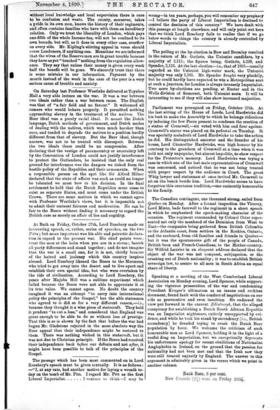On Saturday last Professor Westlake delivered at Toynbee Hall a
very able lecture on the war. It was a war between two ideals rather than a war between races. The English was that of "a fair field and no favour." It welcomed all corners who would behave properly. It permitted nothing approaching slavery in the treatment of the natives. The Boer ideal was a purely racial ideal. It meant the Dutch language, Dutch methods of government, and Dutch modes of dealing with the natives, which were much harsher than ours, and tended to degrade the natives to a position hardly different from that of slavery. But the Boer ideal, though narrow, was not to be treated with disrespect. Between the two ideals there could be no compromise. After declaring that the vestige of paramountcy or suzerainty left by the Convention of London could not justify interference to protect the Outlanders, be insisted that the only real ground for interference was the dangers we risked from the hostile policy of the Republics and their armaments. When a responsible person on the spot like Sir Alfred Milner declared that the state of affairs was such as could no longer be tolerated we must bow to his decision. In the final settlement he held that the Dutch Republics must cease to exist as separate States, and must come under the British Crown. There are some matters in which we cannot agree with Professor Westlake's views, but it is impossible not to admit their eminent fairness and moderation. He can be fair to the Boers without finding it necessary to regard the British case as merely an affair of lies and cupidity.






















































 Previous page
Previous page